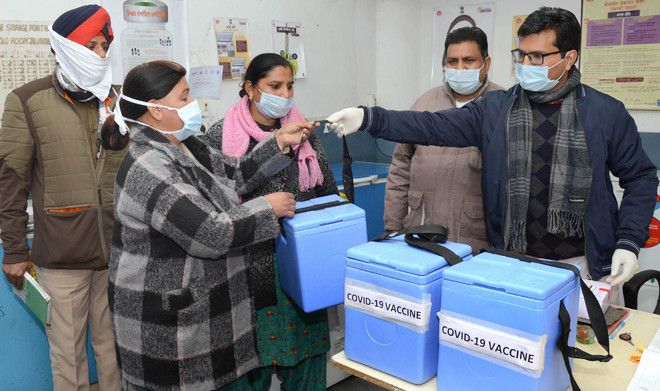Vaccine Nationalism and Inequities in the Global Vaccination Campaign

As of May 1, 2021, India registered a record 400,000 new Covid-19 cases as its health systems buckles under a surge of new infections (1). Hospitals in Madhya Pradesh, Maharashtra, and Uttar Pradesh— some of India’s most populous states— are saturated with patients; one the outside are long lines of people waiting to admit their afflicted loved ones. On the other side of the world, Brazil is also grappling with a surge in cases amidst the Federal Government’s absent leadership and sluggish vaccination campaign. Brazil has inoculated 14% of its population, a rate much lower than that of regional neighbors Chile and Uruguay, which have vaccinated 45% and 35% of their populations respectively (2). The United States, once the epicenter of the pandemic last autumn seeing a precipitous drop in new cases and deaths as the country nears a 47% vaccination rate. This same trend is visible in Europe where the continent— specifically the aggregation of European Union member states— has administered vaccines to almost 30% of its residents. Despite a strong start to vaccination campaigns in developed nations, we are seeing a divergence in fatalities and new cases between countries rich enough to have first-hand access to vaccines and developing countries. As of April 23, 81% of the nearly 900 million vaccines administered have gone to developed countries, while 0.3 percent have gone to developed and low-income countries (3). As long as this gap exists, some health experts say, we may see the emergence of more infectious and deadlier variants which will further derail the global vaccination campaign.
Vaccine Nationalism
Although most of the gap in vaccination rates between developed and developing nations can be attributed to richer countries housing many of the world’s vaccine production facilities and having substantially more funds to purchase vaccines from suppliers, “vaccine nationalism” exacerbates this inequity. Often, countries with the infrastructure to produce vaccines en-masse have imposed export controls to shore up their domestic vaccination campaigns. In March, the European Commission decided to enforce export controls on vaccines and precursor materials after the bloc’s late acquisition of Pfizer-BioNTech and Moderna vaccines, and the failure of the bloc’s domestic producers (see Sanofi-Pasteur). Although outcry over the bloc’s decision had been loudest across the English Channel, export controls made it hard for other developed and developing nations to receive access to vaccines (4).
The European Union is not alone in its decision to curtail vaccine exports. The United States has also followed a conservative approach to ensuring global access to vaccines, even in the face of a slowing vaccination drive due to vaccine hesitancy. According to the Economist, the United had stock-piled 26 million doses of the AstraZeneca vaccine despite the US Food and Drug Administration not having authorized their use in the country’s domestic campaign (5). Even if the United States were to authorize the vaccine, having already purchased more than 300 million doses from Pfizer and Moderna as a part of Operation Warp Speed, the country would have little to no use for them. Even as India’s catastrophic second wave has led to calls for the Biden Administration to export some of the country’s stock-piled vaccines, the administration is still hesitant to make use of its backlog, and instead sent medical equipment, such as respirators and oxygen tanks (6).
Among leading health experts, there is fear that as long as a substantial number of people remain unvaccinated, new and deadlier variants can emerge. According to the executive director of UNICEF, Henrietta Fore, as long as the virus remains “unchecked” around the world, the threat of vaccine-resistant variants will remain and grow larger (7). Such fears merit a more equitable distribution of vaccines to citizens in the Global South.
Future of COVAX and the Global Vaccination Campaign
In the face of vaccine nationalism, there have been some calls among world leaders and health officials to relax export controls and ensure that developing nations also have access to vaccines. On this note, the Biden Administration has pledged over $ 4 billion towards the COVAX vaccination project, a multilateral fund that pools contributions from member states and purchases vaccines for all member states (8). Although the initiative will benefit from more funding, since COVAX has bought vaccines significantly later than developed nations, COVAX will fail to reach its goal of vaccinating 2 billion people by the end of this year (9). Moreover, the Biden Administration is starting to loosen export control as the White House announced it will relax its export ban on raw materials used in vaccine production. Although these contributions may help fight the pandemic in the long run, many public health experts— and even President Biden— have advocated for relaxing IP protections to help countries develop vaccines domestically (10).
As life returns to some semblance of normalcy for many in the West, it is imperative to realize that the global battle is not over yet, and will require large-scale cooperation for months to come. For now, developed and developing nations should pool know-how and industrial capacity to aid India and other heavily afflicted countries.
Sources
- https://www.washingtonpost.com/world/2021/05/09/india-coronavirus/
- https://www.nytimes.com/interactive/2021/world/covid-vaccinations-tracker.html
- https://www.reuters.com/business/healthcare-pharmaceuticals/tedros-denounces-vaccine-inequity-covax-sharing-scheme-marks-first-year-2021-04-23/
- https://www.dw.com/en/eu-tightens-covid-vaccine-export-controls/a-56975604
- https://www.economist.com/united-states/2021/04/25/america-has-locked-up-supplies-of-covid-vaccines-that-it-does-not-need
- https://www.washingtonpost.com/politics/us-india-covid-aid/2021/05/02/9d440f6c-ab69-11eb-ab4c-986555a1c511_story.html
- https://www.chicagotribune.com/opinion/commentary/ct-opinion-pandemic-vaccine-global-fore-20210420-ej7h25yitvebths5klzl44yp5m-story.html
- https://www.npr.org/2021/02/18/969145224/biden-to-announce-4-billion-for-global-covid-19-vaccine-effort
- https://www.reuters.com/business/healthcare-pharmaceuticals/tedros-denounces-vaccine-inequity-covax-sharing-scheme-marks-first-year-2021-04-23/
- https://www.businessinsider.com/vaccine-patents-ips-monopoly-vaccination-process-us-biden-africa-2021-2



